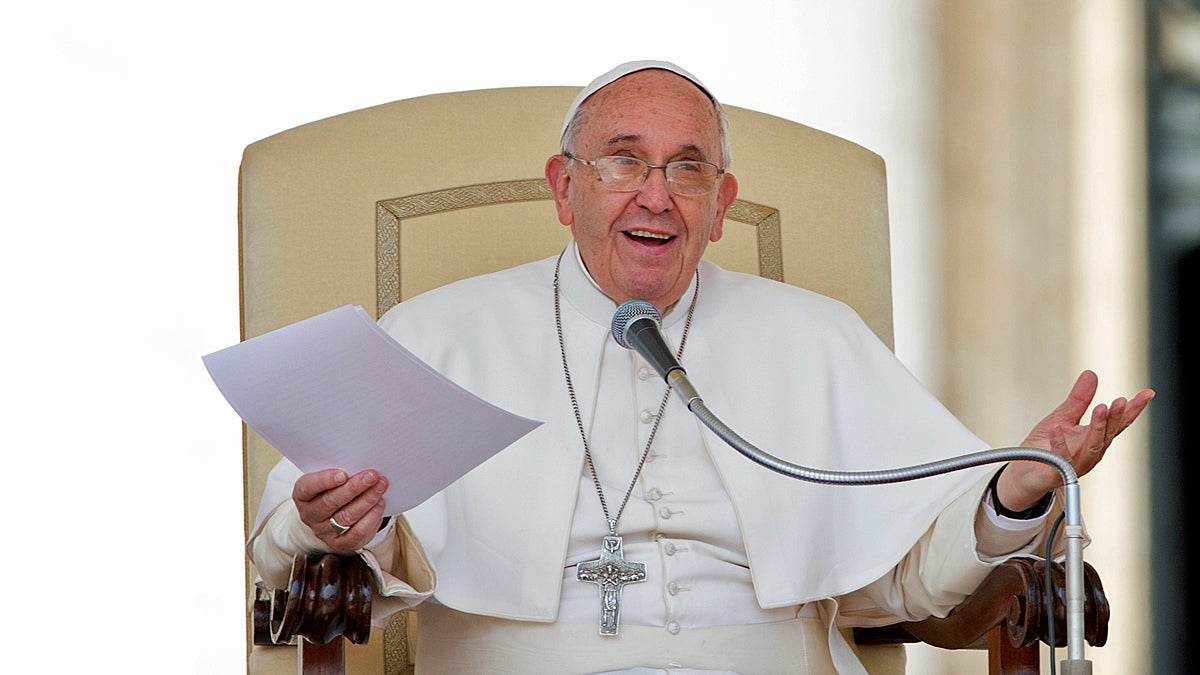Pope Francis expected to push environment message on U.S. trip
Listen
Pope Francis is expected to push his particular brand of environmental stewardship in front of world leaders during his visit to the U.S. later this month. (AP file photo)
Three months after the publishing of the pope’s landmark encyclical on the environment, Catholic parishes and universities are starting to incorporate the document into their teachings and daily operations.
The 180-page encyclical titled Laudato Si, an open letter to all people, critiqued consumerism and the degradation of the environment and called for action on climate change.
The message has been divisive among Catholics, and Pope Francis is expected to push his particular brand of environmental stewardship in front of world leaders during his visit to the U.S. later this month.
Climate as a wedge issue among Catholics
When the Catholic Diocese in Orange County, California held the country’s first diocesan conference on the pope’s encyclical last month, an audience member interrupted a question-and-answer session to protest, yelling that the conversation was “heresy.”
The event illustrates how Pope Francis’ outspoken stance on climate change has become a wedge issue among the country’s faithful. Some Republican politicians have questioned if the pope should be providing scientific advice. Others see his encyclical as an attack on capitalism.
Pope Francis touched on specific policies in his encyclical, writing about air conditioners as electricity hogs and recommending energy-efficient repairs to buildings. Fr. Robert Sirico, president of the Acton Institute, a think tank that advocates for free market economics informed by faith, calls that level of detail on scientific topics imprudent.
“Should in 25 years or in 50 years we discover that some of the specific policy prescriptions were not the best, then the church gets tagged with all of that,” Sirico, said.
Sirico, a Catholic priest, is not alone in his opinion. The pope’s favorability ratings dropped from 76 percent in early 2014 to 59 percent in July, shortly after the release of his encyclical, largely due to changes in opinion from political conservatives.
Even after that drop, however, the pope’s approval ratings remain high. Dan Misleh, head of the Catholic Climate Covenant, argues that those who disagree with the pope’s opinions on climate change make up a small, if vocal, minority.
“I think many more Catholics are encouraged,” Misleh said. “I think they’re pleasantly surprised, or happy that he’s speaking out.”
Conversation changing within the Church
Misleh said the climate change conversation has changed “fairly significantly” with the release of the encyclical, as church and university leaders analyze the document and decide what it should mean for their institutions.
In July, the Archdiocese of Chicago became the first in the nation to work with the Environmental Protection Agency to track its buildings’ energy use, water consumption and greenhouse gas emissions. In August, the Archdiocese of Cincinnati announced it too is working to lower energy usage.
“There’s lots of things like that happening, far more than we can keep track of,” said Misleh, whose organization works with Catholic institutions to educate people on climate change.
The encyclical will be the focus of a panel discussion at Villanova University next week, and a core text for a masters-level sustainable engineering class at the Catholic university.
Villanova’s dean of engineering Gary Gabriele said the papal encyclical’s focus on the inter-connectedness of people and the Earth has reinforced an emerging theme that engineering students should be learning more than just science and math.
“Engineering impacts the world in so many different ways that our students, as part of their education, need to understand,” Gabriel said. “That’s clearly a very, very strong theme in the encyclical.”
Pope expected to focus on the environment in Congress, U.N.
Even as his messages start making an impact at Catholic institutions, Pope Francis has a lot of ground to cover with the general public.
A month after he released his letter, an Associated Press and University of Chicago poll showed that fewer than a third of Americans knew climate change was a priority issue for this pope. The percentage who saw climate change as a moral or religious issue didn’t shift.
The pope’s “care for creation” theme is likely to be a significant focus of his upcoming U.S. tour as he tries to galvanize support for action on climate change.
“He has invested his capital in this issue uniquely,” said Rocco Palmo, author of the influential Catholic blog “Whispers in the Loggia.”
“He knows if “care for the Earth” is going to be real, it’s got to come in the policy arena, so it’s going to be probably one of the top two or three things he talks about,” Palmo said.
The Pope is expected to urge members of Congress to act on climate change during his address in Washington on the Thursday Sept. 24. The environment is also likely to be a focus of his keynote address to the United Nations the next day in New York, as world leaders prepare for a U.N. conference on climate change in Paris in November.
The environment isn’t likely to be on the pope’s official Philadelphia agenda, where he is expected to focus on immigration and religious liberty, but as Francis is well-known for going off-script, it is anyone’s guess if he will pick up his push for environmental stewardship in impromptu comments here.
WHYY is your source for fact-based, in-depth journalism and information. As a nonprofit organization, we rely on financial support from readers like you. Please give today.



